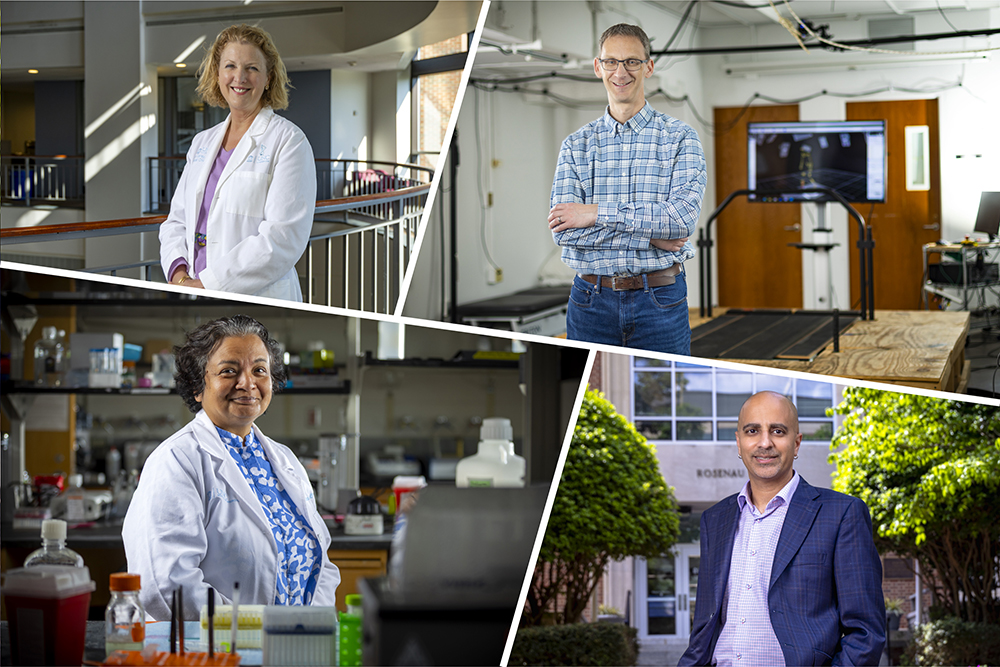UNC-Chapel Hill draws people from across the state and nation to participate in its nearly 1,200 clinical trials. These studies are vital for medical innovation, helping us understand which treatments are most effective and safe.
For some participants, clinical trials provide access to cutting-edge treatments, offering new hope for those struggling with conditions that fail to respond to traditional therapies. Others are driven by a desire to contribute to research that has the potential to change countless lives.
Engaging in clinical trials also empowers patients, placing them at the center of their health journey and encouraging meaningful discussions about their treatment options. These studies give people a sense of hope, community, and purpose.
“Our patients rely on us to provide the best care possible, and this care needs to be informed by evidence,” explains Mike Lewek, a physical therapy professor at UNC-Chapel Hill. “Clinical trials allow us to test new and developing treatments and to verify that what we think has an impact on outcomes actually does.”
In honor of Clinical Trials Day, researchers from around the university unpack the trials they’re working on and how they could benefit people in North Carolina and beyond.
Impact Report
![]()
Clinical trials at UNC-Chapel Hill promote advancements in health care and economic growth while improving health outcomes and informing effective health policies for North Carolinians.
![]()
5,700 participants are actively enrolled in clinical trials at Carolina.
Boosting mobility for people with Parkinson’s disease
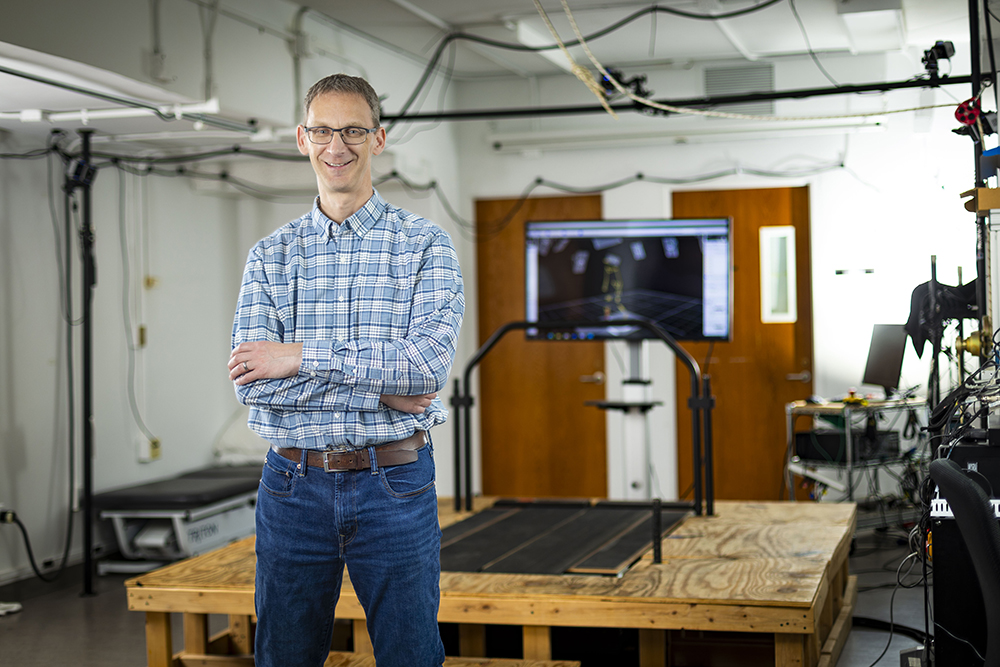 photo by Megan Mendenhall
photo by Megan Mendenhall UNC School of Medicine researcher Mike Lewek is running a clinical trial with colleagues Eran Dayan and Nina Browner to improve walking for people with Parkinson’s disease.
What is your research focus?
We work with people who have Parkinson’s disease (PD), a brain disorder impacting movement, balance, and coordination. These individuals often walk with slow, short, shuffling steps. As part of our rehabilitation process, we help them take longer steps by synchronizing their steps to a metronome, a tool used to maintain tempo in music.
Metronomes provide timing cues that aid in learning to move more effectively. Our practice facilitates use-dependent learning, repeating desired movements over and over to change movement patterns.
Tell us about the clinical trial you’re running.
We are examining how we can use various forms of motor learning to create durable, long-term effects on walking for people with PD. My lab has developed a unique method of using a metronome that addresses both the timing and the distance of the steps that people take, parameters that are important to improving walking.
In our clinical trial we are comparing walking with and without this cueing to improve long-term retention of walking. Participants do a series of baseline tests and then complete 12 training visits over a month. They then repeat the walking tests after we complete training, and again three months later to determine how much of the changes they have retained.
Participants also undergo an MRI of their brains to see how the brain changes as it learns. This information will help us understand how to structure interventions that make use of intact pathways, connections, and subsections of the brain. Ultimately, we hope to make our walking changes more durable for longer-term impacts.
What would you like to see happen in the future for your research in the clinical trials space?
I would like to expand my clinical trials to multiple sites and move into community settings. Currently, our work is done in a research lab due to specific data collection needs, but training can be done anywhere with a treadmill. I’d like to partner with outpatient facilities to replicate our findings on a larger scale and measure longer-term outcomes. Just because something works well in a research setting doesn’t mean that it will work everywhere, so translating those findings is critical.
Expanding life expectancy for people with brain cancer
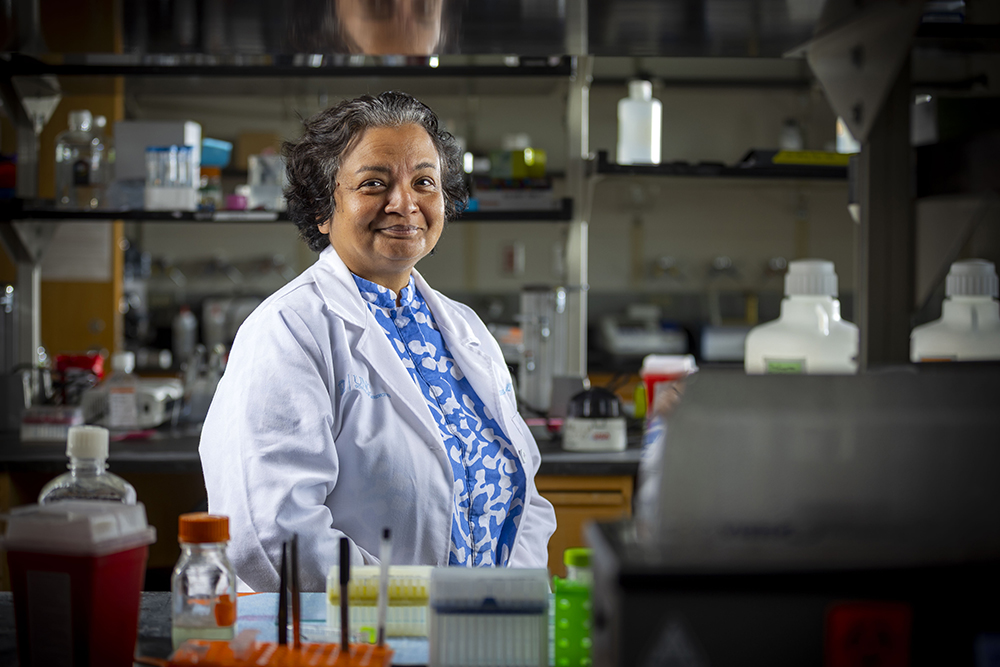 photo by Megan Mendenhall
photo by Megan Mendenhall UNC School of Medicine researcher Soma Sengupta is running clinical trials to develop new treatments for an aggressive type of brain cancer called glioblastoma.
What is your research focus?
I’m a physician-scientist specializing in brain tumor treatment and research, and my primary focus is to improve treatment outcomes for patients with brain cancer. The standard approach for treating glioblastoma does not significantly extend the survival outcomes of patients. The journeys of the patients and their families are so hard that I feel my colleagues and I need to shift treatment paradigms to make a difference.
Tell us about the clinical trials you’re running.
My team, which consists of scientists, research coordinators, and regulatory personnel, is currently running over nine trials.
An example of one of these clinical trials is for patients with a new diagnosis of unmethylated MGMT promoter glioblastomas — a type of aggressive, malignant brain tumor. Participants will be randomly assigned to two different doses of a new cancer drug called ropidoxuridine during six weeks of radiation therapy.
We also have an expanded access program for patients who have exhausted available treatments. They will try a new oral therapy called gallium maltolate, which has proven effective for patients with various cancers.
Have you made any discoveries thus far?
I have discovered how a neurotransmitter receptor in the brain, called GABA-A, works in cancer and immune cells and have established how it can be targeted with a new class of molecules for treatment. GABA-A receptors are a therapeutic target for drugs like benzodiazepines, which can help alleviate anxiety, insomnia, and nausea.
GABA is also found throughout nature. Plants and insects need it to survive. It helps transport metabolites — small molecules that break down substances — into cells. For example, if you go into a field of lavender, you’ll start to feel relaxed because the fragrance is acting on your GABA-A receptor.
The same receptor is present in cancer cells, but it acts differently in non-cancerous cells. We have identified a class of drugs that can kill the cancer cells through this receptor, without affecting normal cells in the same way.
What are your hopes for the future of clinical trials?
A huge part of my research is centered on advocating for patients and caregivers and advancing technologies that have the potential to improve patient quality of life through art, music, and creative writing.
I’m currently collaborating on a study assessing an app for young adults who have survived cancer. It provides them with digital art therapy through weekly prompts to improve their moods. The app was created by a team of designers, artists, art therapists, and clinicians working together to find new ways to help patients.
Whether I’m advocating for the patient, working in the lab, or studying apps, my focus is on improving the quality of life for these patients and improving their outcomes.
Preventing and treating diseases with omega-3s
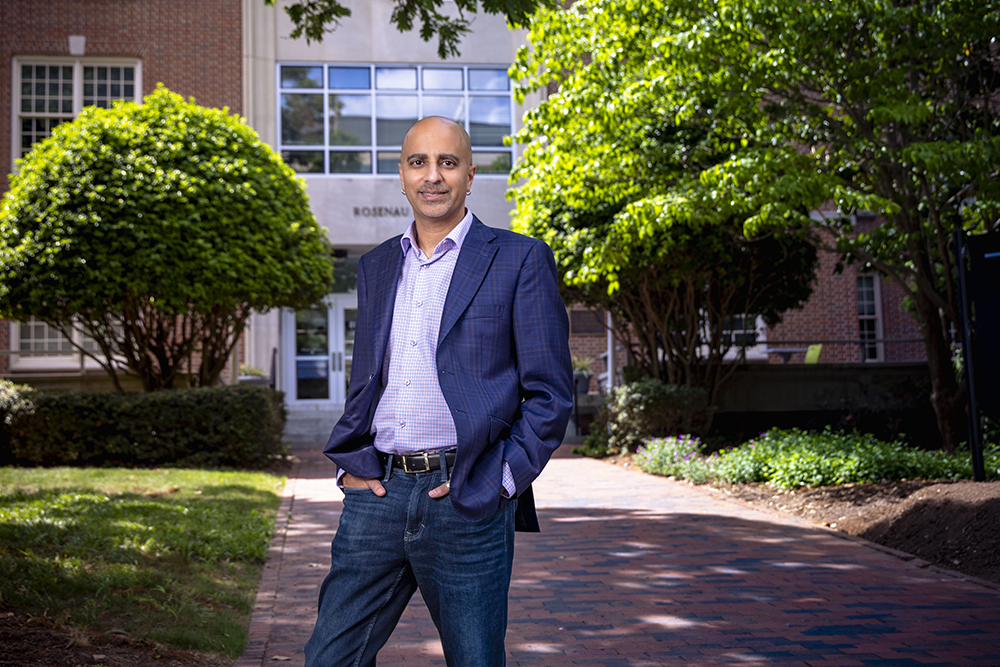 photo by Megan Mendenhall
photo by Megan Mendenhall UNC Gillings School of Global Public Health researcher Saame “Raz” Shaikh is running clinical trials to test how omega-3 fatty acids may prevent and treat various diseases.
What is your research focus?
Long chain omega-3 fatty acids, which are found in oily fish and as dietary supplements, are poorly consumed in the Western diet. In fact, some argue that we are highly deficient in omega-3s, which may help prevent and treat various diseases.
I am focused on understanding how increased dietary consumption of omega-3 fatty acids can improve differing aspects of human health. For example, I am interested in understanding the mechanisms by which long chain omega-3 fatty acids lower chronic inflammation in obesity and other diseases.
Thus far, select omega-3s are clinically approved for lowering elevated triglycerides — a type of fat — and lowering the risk of cardiovascular diseases. Data also suggests they may have a role in infant development, preventing pre-term births, and treating select aspects of depression.
Tell us about the clinical trials you’re running.
We recently completed a clinical trial with a unique fish oil that is high in a fatty acid known as omega-7 to treat inflammation in healthy adults. We are also starting a study with a unique omega-3-enriched fish oil in adults with obesity. Our work is being conducted at the UNC Nutrition Research Institute in Kannapolis, N.C.
Have you made any discoveries thus far?
We are studying how metabolites made from omega-3s, which we think are critical for inflammation, increase upon omega-3 consumption. Thus far, we have found that some metabolites increase in the blood after a month of dietary supplementation in adults with obesity. Our goal now is to test a long-term, 12-week intervention to determine if key molecules made from omega-3s are increased in the blood.
What would you like to see happen in the future for your research in the clinical trials space?
Our immediate goal of the research program is to further test the effects of omega-3 fatty acids for improving inflammation by establishing mechanisms and efficacy in the adult population with obesity. The proof-of-concept efficacy part will require placebo-controlled clinical trials focused on inflammation in select patient populations based upon their genetic background and other variables. We also aim to increase consumption of omega-3s in North Carolinians with increased consumption of fish off our own coast.
Transforming care for people with breast cancer
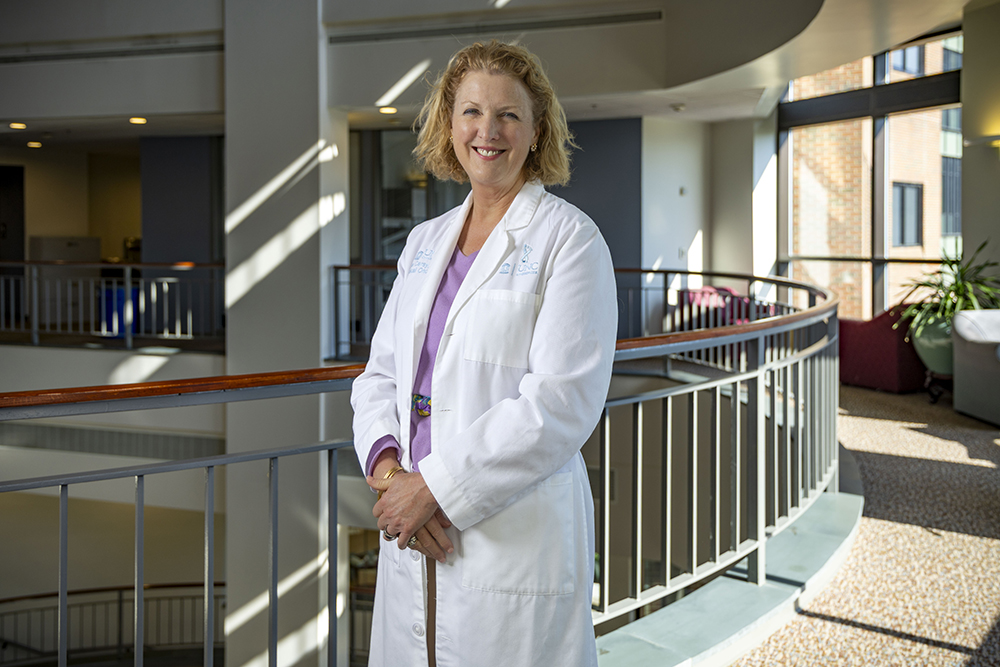 photo by Megan Mendenhall
photo by Megan Mendenhall UNC School of Medicine researcher Lisa Carey is running clinical trials to improve breast cancer treatments.
What is your research focus?
In addition to being a breast cancer doctor, I design and run clinical trials, either testing treatment approaches or examining biologic features as predictors of treatment effectiveness or survival. Those trials are based on clinical challenges I see my patients struggle with every day.
Tell us about the clinical trials you’re running.
There are many trials at Carolina — we have a very engaged group of researchers! I have two that I am particularly involved with. One is testing whether knowledge of the underlying biology of breast cancer helps oncologists make better treatment decisions for incurable or metastatic disease, when cancer cells have spread to other parts of the body. The other trial is examining features of antibody-drug conjugates, a type of cancer treatment that combines a monoclonal antibody — a protein made in a lab to mimic a part of the immune system — with a chemotherapy drug.
Beyond my work at UNC-Chapel Hill, I co-chair the breast cancer committee for a national clinical trials network that runs National Cancer Institute-sponsored clinical trials in the U.S. and Canada. In this setting, I have helped develop and run several trials, including two that are designed to evaluate if therapy can be safely shortened to improve patient comfort. A third trial is testing a lower dose of a common drug to see if it is as effective as a higher dose in order to reduce side effects. Another trial is examining whether adding more medications for high-risk breast cancer can improve the cure rate.
Have you made any discoveries thus far?
The work that I did at Carolina, along with multiple international collaborators, led to the development of a test that may allow us to tailor therapy safely and effectively in a particular kind of breast cancer.
For the national clinical trials network, trials that I oversee have demonstrated that:
- aspirin does not help prevent breast cancer recurrence;
- combining two antiestrogen therapies together does not provide additional benefits compared to using just one;
- adding a targeted drug to metastatic treatment of a particular kind of breast cancer doubled the amount of time that the cancer was controlled; and
- you can safely perform lumpectomies, instead of a mastectomy, in patients diagnosed with multiple breast cancers.
What would you like to see happen in the future for your research in the clinical trials space?
I think there is a huge challenge in supporting young physician scientists getting started in research. We also need to simplify clinical trials so that they can be less expensive and easier to run.


